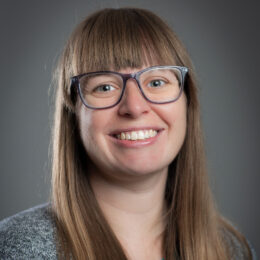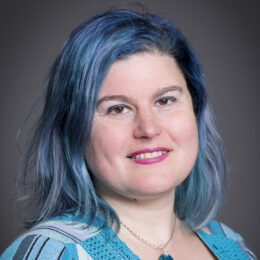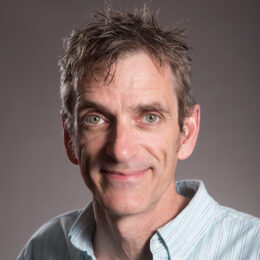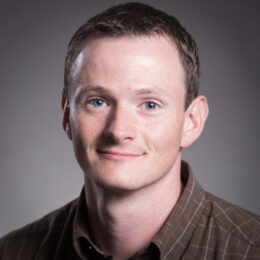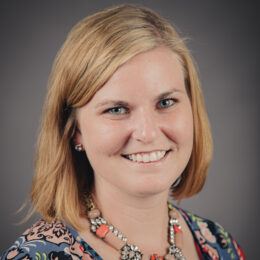Dr. R. Emerson and Evelyn Niswander Department of Biology
The Dr. R. Emerson and Evelyn Niswander Biology Department was made possible by a generous donation from Dr. Jane Henney ’69 and Dr. Robert Graham. Dr. R. Emerson (‘Doc’) Niswander served Manchester University as a Professor of Biology and Head of the Biology Department from 1950 to 1982.
He was highly regarded as a scholar and was deeply committed to his students, many of whom became teachers, scientists, lab technicians, physicians, and dentists. Some became well-known, including Dr. Jane Henney, who for more than 30 years has served in a series of senior health policy leadership positions, most notably as the Commissioner of the U.S. Food and Drug Administration.
Evelyn Niswander served Manchester University as an Instructor of Home Economics in 1958 and then as the Supervisor of Food Service from 1959 to 1966. The Niswanders were highly respected and active members in both the University and North Manchester communities. ‘Doc’ and Evelyn were instrumental in the establishment of the North Manchester Center for History. Dr. Niswander served on the Wabash County Hospital Board and was a member of the Wabash County Economic Development Committee. After the couple moved to Timbercrest, Evelyn served as the Food Service Director until her retirement in 1978. ‘Doc’ preceded Evelyn in death at the age of 97 in 2011. Evelyn passed away at the age of 102 in 2020. ‘Doc’ and Evelyn Niswander were both people of great ability and conviction whose legacy continues to enhance the department’s ability to graduate biologists of ability and conviction which honor the Niswander legacy.
Department Life
Co-Curricular Activites
Tri-Beta
Beta Beta Beta (TriBeta) is a society for students, particularly undergraduates, dedicated to improving the understanding and appreciation of biological study and extending boundaries of human knowledge through scientific research. Since its founding in 1922, more than 200,000 persons have been accepted into lifetime membership, and more than 553 chapters have been established throughout the United States and Puerto Rico.
Environmental Group
The MU Environmental Group is primarily run by students concerned with protecting and preserving the earth while educating students and the community about such issues as recycling, reducing consumption and global environmental trends. You can follow them on Instagram: @muenvironmental
ZOOLOGY CLUB
The Zoology Club is run by students who love all animals. This club engages in unique activities that involve the maintenance of animals and their habitats. Through hands-on interactions, Manchester students expand their knowledge of different species, their behavior, and their environments. You can follow them on Instagram: @manchesterzoology
Hands On Learning
Manchester University’s campus features multiple ecosystems that students can study on their journey to a biology major. In less than a 5-minute walk from the Science Center, students can explore prairies, forests, and rivers.
Manchester University also owns and operates The Koinonia Environmental and Retreat Center, only a 15-minute drive away. Koinonia is about 100 acres filled with diverse ecosystems including forests at different growth stages, wetlands, streams, and a large lake, a perfect place to study ecology!
Environmental Studies – Eel River Dam Removal
Students and volunteers from Manchester University, the Middle Eel River Watershed Initiative, and the Ohio River Basin Fish Habitat Partnership of the United States Fish and Wildlife Service got their hands dirty and feet wet as they worked to remove two 150+ year-old dams from the Eel River. Manchester University students continue to monitor and research the Eel River since the removal of the habitat-impairing dams.

January Session - London
Development of Modern Scientific Thought
Students travel to London to visit museums and historically important scientific moments. During this trip, they improve their critical thinking and interdisciplinary skills by examining how history, politics, social structure, and religion played a role in shaping science.
January Session - Guatemala Medical Practicum
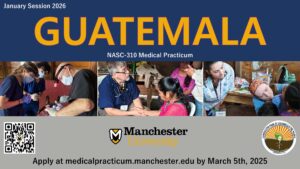
More information about the Medical Practicum
Medical Practicum Instagram
A Journey of Discovery and Service
The Medical Practicum at Manchester University is more than a three-credit class – it’s a life-changing experience for MU students. While the nearly three-week-long excursion to Central America is excellent for anyone who is motivated, it’s probably most useful for those with a future in health care who have yet to apply to professional and graduate schools. It often helps students to discover their true passions and steer their next steps.
The faculty-guided practicum partners students with a team of U.S. physicians, nurses and other health care professionals to serve patients of all ages in Central American communities, where quality care is in short supply. The practicum team has traveled through mountains, jungles and rivers – by bus, 4-wheel-drive vehicles and dugout canoes – to remote villages – often without running water or electricity.
Besides serving hundreds of patients with medical and dental needs, as well as animals in need of veterinary care, practicum students experience a culture very different from their own and observe first-hand the challenges faced by the people of this developing area.
History
Founded in 1981 by Dr. Ed Miller, the practicum turned 44 in 2025. After serving villagers in Nicaragua for more than 20 years, 2019 saw a relocation to Maya villages in Guatemala. Previous trips were made to Panama, Honduras, Dominican Republic, Costa Rica, and Guatemala. To date 468 Manchester students, along with 161 different health care providers and 72 other staffers have served more than 50,000 patients since its inception. Over half of practicum alumni have entered health care careers, including 104 physicians, 28 dentists, and 36 pharmacists.
An Embodiment of Mission
The practicum exemplifies Manchester’s mission to graduate persons who lead “principled, productive, and compassionate lives that improve the human condition,” and is a testament to Manchester’s distinguished reputation in the sciences and excellence in preparation for health care careers. Students and health care providers pay their own travel expenses, but it takes donations and grants to purchase medical and dental supplies.
Medical Practicum, January 2025
BY THE NUMBERS
- 16 students
- 14 providers: (5 physicians, 1 physician assistants, 1 nurse practitioner/certified nurse midwife, 2 pharmacists, 2 dentists, 1 4th-Year M.D. student, 1 resident, 1 laboratory technician, from the U.S.
- 3 dentists, 2 Mayan-speaking nurses, 7 interpreters, and 6 community development workers from Guatemala
- 1,559 medical consultations
- 2,839 prescriptions filled
- 454 dental extractions
- 323 lab tests performed
- $28,556 used for reduced price medicines and medical/dental supplies
- Thousands of dollars’ worth of medicines and medical/dental supplies acquired through donation
Study Abroad Scholarships
Miller Study Abroad Scholarship Award
Because of their interest in international cultures, Ed and Martha Miller established this scholarship to aid students who desire to study and learn abroad. Any Manchester University undergraduate student enrolled full-time who plans to study abroad for a year, semester, or January Session is eligible, with preference given to natural and health science majors. Recipients will be selected on the basis of merit, motivation, and need. These award scholarships range anywhere from $500-1,500 and are in addition to the usual student aid and normal finances of the student. Award recipients must arrange and participate in the study abroad experience of a year, semester, or January Session between May 2024 – April 2025, prior to graduation. Failure to participate in the study abroad experience for which the award was given will result in the loss of funds. Students who are interested should apply before the deadline of March 25, 2024 to be considered.
Use this application link to apply for the Miller Study Abroad as well as the other Manchester University donor-supported study away scholarships.
Your application is on or before Monday, March 25. Please email the Office of Study Away at studyaway@manchester.edu if you have any additional questions.
Mission and guiding principles
Biology Mission and Guiding Principles
Mission
The Niswansder Department of Biology is dedicated to providing a welcoming academic environment with student-focused mentoring to graduate persons with the communication skills and technical expertise necessary to address today’s complex biological challenges to improve the human condition.
Guiding Principles
The Niswander Department of Biology respects the infinite worth of every individual. We acknowledge the limitation of our own individual perspectives and value the unique perspectives brought by every individual into our program. Central in our curriculum is experiential learning and active participation in the scientific process to develop critically thinking and problem-solving scientists.
Students graduating from the Niswander Department of Biology will have the necessary foundational knowledge and technical skills to…
- analyze and summarize primary biological literature.
- design and perform novel research in biology with appropriate techniques and statistical analysis.
- adjust their written and oral communication skills to present biological topics to other scientists and to non-scientists.
- confidently engage as a biologist in interdisciplinary conversations about complex topics.
- utilize critical thinking to evaluate and propose a solution to biological challenges.
In our curriculum, the six unifying principles of biology are evolution, structure and function, energy flow and transformation, information flow and storage, and equilibrium. These six principles are first introduced in Principles of Biology I and II. These principles are then reinforced and presented in the context of each upper-level course. Corresponding laboratory sessions allow students to apply these principles to scientific questions and research while honing their technical skills. Every student takes part in a research or internship experience to have firsthand experience in a related real-world setting.
Environmental Science Mission
To provide students experiential learning opportunities and rigorous academics rooted in natural sciences, political sciences, economics, and philosophy to better understand the human endeavor in the context of responsible environmental stewardship.
Biology-Chemistry Mission
To provide a challenging and supportive academic environment where students can explore and master the fundamental conceptual areas of biology, chemistry, and physics at the molecular, cellular, and organismic levels of life for work to improve the human condition.
Meet the Faculty
Department Research and Internships
Biology Research
Student Research
Students in the biology department have the opportunity to perform authentic research with faculty in the department and receive support for external research opportunities which fit the student’s interest. Our students often attend conferences to present their research to a wide audience, such as the Indiana Academy of Sciences, Indiana Physiological Society, American Society of Plant Biologists, and Manchester University’s Annual Student Research Symposium.
Faculty Research
The overarching theme of Dr. Robison’s lab lies in understanding the influence of abiotic factors on the physiology and biochemistry of plants. With our changing climate, understanding abiotic effects would help us predict how plant responses which is imperative for continued improvement in food production and maintaining biodiversity. Her lab uses various techniques to examine project questions from a physiological, molecular, and/or genetic perspective.
Ever since she was an undergraduate student herself, Dr. Gohn has been interested in maternal-fetal research. Her studies aim to identify how maternal exposure to teratogens during pregnancy impacts fetal development and long-term health outcomes in the offspring. Dr. Gohn’s lab uses mice to as a model for developmental biology and birth defect studies.
Biology-Chemistry Research and Internships
Research – Local
- The Donald B. Miller Student Research Endowed Fund
- MU Summer Undergraduate Research Internships in Pharmaceutical Sciences
Research – National
- The National Science Foundation – REU program: The largest program and with the most possibilities.
- Summer Undergraduate Research Programs for Medical Education: Excellent summer programs for those pursuing healthcare/research careers.
- The National Institutes of Health: The largest biomedical research institution in the U.S.
- Institute of Education Sciences
- The National Science Foundation Centers for Technology: An additional research program of the NSF
- The Environmental Protection Agency
- The US Department of Agriculture
- ACS internship, co-op, and research
- Friends of Taiwan Summer Undergraduate Research Fellowship Program (FAQ)
Internships – Local
- Medical Practicum: A short term experience in global health
- Shepherd Summer Internship: Many healthcare-related placements
- Manchester University Office of Career and Professional Development
Internships – Regional
- Parkview Summer Internship Program
- Matthew 25 free clinic in Ft. Wayne
- 85 Hope free clinic in North Manchester
- Zimmer-Biomet: An orthopedic company in Warsaw, IN
Internships – National
- Zoetis: A global animal health company dedicated to supporting customers and their businesses in ever better ways.
- ACS internship, co-op, and research
Research Scholarships
Donald B. Miller Student Research Scholarship
This endowed scholarship award supports undergraduate research for any undergraduate students who are majoring in Chemistry or Biology-Chemistry.
An award in the amount of $2200-$4400 will compensate a 200-400 hour undergraduate research experience of the student’s choice (approval must be granted). The research experiences must take place between May 2025 and August 2025, prior to graduation. The research experience must also not have another associated stipend or wage. Priority is given to research experiences done on Manchester University’s campus, but off-campus research experiences are still eligible. The 2025 application is now open and due on April 24. Interested students should consult the documents below.
Student Application 2025
Faculty Recommendation 2025
The Donald B. Miller Student Research Fund was established by Ed and Martha Miller in 2018 to honor Ed’s brother, Don Miller (1930-2016), who graduated with distinction from Manchester College in 1952 with a B.A. in chemistry. He received his M.Sc. and Ph.D. from The Ohio State University, focusing his doctoral research on the synthesis, structure, and chemistry of the photodimers of β-nitrostyrene. He was a polymer research chemist for Conoco in Ponca City, OK, (1957-1965) and Stanford Research Institute, Menlo Park, CA, (1965-1974). He joined NASA Ames Research Center in 1975, where he worked on projects to determine concentrations of stratospheric ozone and nitric oxides. Next, he relocated to Oregon State University in Corvallis where he worked on environmental projects in the departments of Sanitary Engineering, Oceanography, Soil Science, and Forest Products (wood preservation) until his retirement. His research resulted in over 30 patents and research publications.





